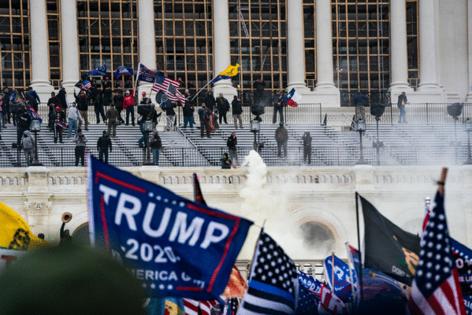Commentary: After the Supreme Court's immunity ruling, can Donald Trump still be tried for Jan. 6?
Published in Political News
The Supreme Court ended a tumultuous term with one final sledgehammer blow on Monday. Its decision on Donald Trump’s claim of immunity from criminal charges forecloses any possibility that he will be tried for Jan. 6 before the election, substantially guts the prosecution and reshapes the Constitution to place the president singularly beyond the reach of criminal law.
The opinion was even more expansive in its grant of presidential immunity than commentators anticipated after the oral argument suggested the conservative majority was headed that way. And while it theoretically permits prosecution of some of the long list of Trump’s pernicious and treacherous acts in the weeks after the 2020 election, it erects a series of legal roadblocks and presumptions that make it anyone’s guess whether Trump will ever face accountability under the indictment.
The court’s essential holding is that constitutional principles of separation of powers forbid the criminal prosecution of a former president for “official acts” that took place during his term, while allowing it for “unofficial” acts. The 6-3 decision broke down along familiar lines, with the conservative majority continuing its project of remaking the law and the structure of the federal government.
How to draw the line between official and unofficial conduct? The court provides several criteria that, albeit somewhat opaque, clearly protect swaths of conduct that would strike nearly everyone as corrupt and lawless — not least much of what Trump undertook after the 2020 election.
For starters, the court prescribes absolute immunity for any exercise of “core constitutional powers.” These include at a minimum the enumerated presidential powers of Article 2 of the Constitution, such as acting as commander in chief of the armed forces, issuing pardons and appointing judges. A president acting within these areas is untouchable.
Importantly, the court holds that this immunity precludes any consideration of motive. So a president who, for example, issues a pardon in return for a bribe or fires an executive branch official out of racial animus is just as protected from the law as one who takes such actions for appropriate and conventional reasons.
This could authorize some of the most vicious and problematic presidential conduct. There is no apparent reason, for example, that it doesn’t encompass what had been taken as a devastating hypothetical offered by Judge Florence Y. Pan of the U.S. Court of Appeals for the D.C. circuit: a president’s use of Navy SEALs to assassinate a political rival. If the reason for a president’s use of commander-in-chief powers is outside the bounds of inquiry, such conduct is indistinguishable from a conventional military mission.
Motive is the soul of the criminal law. It’s what divides conduct society accepts from conduct for which we put people in prison. The declaration that it has no role to play in determining a president’s criminal liability is nearly tantamount to making him a king.
Yet the court’s decision goes considerably further. It immunizes not just core constitutional functions but also any conduct within the outer perimeter of executive authority — the same capacious standard that already applies to civil lawsuits over presidential conduct.
And though there is some debate on this point, the court appears to go even further by imposing a presumption of immunity for conduct outside that perimeter unless the government shows that a prosecution would “pose no dangers of intrusion on the authority and functions of the Executive Branch.”
...continued
©2024 Los Angeles Times. Visit at latimes.com. Distributed by Tribune Content Agency, LLC.







Comments